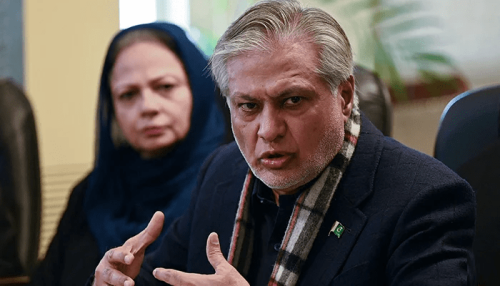Senators from allies in the ruling coalition and the opposition PTI on Tuesday opposed a proposed amendment to Section 230 of the Election Act 2017, which relates to the functions of a caretaker government.
The PML-N on Sunday announced that an amendment was being introduced to empower the interim setup to have powers similar to that of an elected government. These powers would allow the caretakers to take important decisions.
“The interim setup will not be confined to day-to-day affairs of the government till elections are held. An amendment is being brought (to the Constitution) to empower the caretaker setup to take important decisions like an elected government does,” PML-N supreme leader’s spokesperson Muhammad Zubair earlier told Dawn.
The amendment is among several others being proposed to the elections laws ahead of polls scheduled to take place later this year.
The amendments were debated on in a joint Parliament session today.
Speaking on the matter, PPP Senator Raza Rabbani said he had no issue with the amendments in general but objection to changes to Section 230.
“There is a severe conflict of interest when it comes to amending Section 230 because there are countless judgements of the superior courts regarding the role of the caretaker government,” he said, adding that the said role was “very different” from that of an elected government.
“They come for a limited period of either 60 days or 90 days for the purpose of carrying out day-to-day business of the government.
“The government does not go into cold storage, but it goes into slow motion [after a caretaker setup takes the reins]. And it does so because of the simple fact that it is an unelected government and it cannot be put on the same pedestal as an elected government,” Rabbani said.
Referring to an amendment that would empower the caretaker government to take action on “urgent matters”, he pointed out that the term was very “vague and vast” which could include anything and everything.
“This means you, in actual fact, are giving unbridled powers to an unelected government which has been nominated for the sole purpose of holding free and fair elections and bringing it at par with an elected government.”
Rabbani said that extending the powers of the caretaker government would be akin to “putting the last nail in the coffin”.
Similarly, PPP Senator Taj Haider maintained that the parliamentary committee on electoral reforms had not discussed the amendment to Section 230. He also expressed concern that no amendment should go against the Constitution.
Senator Kamran Murtaza of the Jamiat Ulema-i-Islam-Fazl, another ally of the government in the Centre, also said that amendments to Section 230 were not under discussion in the parliamentary committee.
He said running the government was the job of “chosen representatives” and not “caretakers”, adding that any amendment to allow interim setups to rule for three or six or nine months would be going against the concept of the Constitution.
Murtaza said his party was not standing with the amendment pertaining to Section 230 and announced his party’s disassociation with it.
For his part, PTI Senator Ali Zafar echoed Murtaza’s views, adding that the parliamentary committee had a very “positive debate” but it had not discussed Section 230.
He said he had hoped that only the amendments and clauses discussed and decided in the committee would be presented in Parliament, adding that he was disappointed, angered and frustrated to see additional amendments which “suspiciously came out of from underneath”.
“I am very surprised and am asking for an explanation on how did this happened,” he said.
Amendments finalised in consultation with political parties: Tarar
However, Law Minister Azam Nazeer Tarar said the proposed electoral amendments were finalised in consultation with all the political parties represented in Parliament.
The minister said a special committee led by Economic Affairs Minister Sardar Ayaz Sadiq, having representation of various political parties, held a series of meetings for thorough deliberations on the amendments.
The members, including Syed Naveed Qamar, Fahmida Mirza, Chaudhary Tariq Bashir Cheema, Syed Aminul Haque, Muhammad Afzal Khan Dhandla, Agha Hassan Baloch, Shaza Fatima Khawaja, Senator Haider, Senator Murtaza, Senator Manzoor Ahmed, and Senator Zafar actively participated in the discussions, he added.
The minister said the amendments were examined “clause by clause” by the committee members, whose written submissions were included in the final report.
Tarar asserted that all the amendments were prepared with consensus, reflecting a “harmonious approach from all the political parties”.
The law minister clarified various points raised by the senators on Section 230 and said that every amendment in the particular bill was discussed in the parliamentary committee.
It was agreed to have a detailed discussion on all amendments in the next sitting.
Minister for Defence Khawaja Asif supported the law minister’s statement, affirming that all electoral amendments were made with the consensus of all political parties present in Parliament.
He criticised the previous government for its practice of carrying out legislation without adequate consultation with political parties.















































Dear visitor, the comments section is undergoing an overhaul and will return soon.